________________
~:250:~
bhavyata iti bhāvanā dhyānābhyasakriyetyarthah. (AVaHaVr2 p. 62) 4. The supportive practices (like contemplation) to make the observance of the Mahāvratas (great vows) more meticulous.
bhavyante väsyante guṇaviseṣamaropyante mahavratani yakabhistä bhāvanāḥ. (Yosd 1.25 Vr p. 121) 5. Disposition of malignment-The behaviour and conduct of one whose Citta (psyche) is imbued with evil disposition. kamdappamabhiogam, kibbisiyam mohamäsurattam ca.
eyão duggalo maraṇammi virāhiyā homti... (U 36.256)
Bhava Nikṣepa
Transferred epithet quâ 'name labblled on an actual fact'-A type of Niksepa (transferred epithet);
the actualized state of the intended activity of the substance (or a person); for instance, the dean actually engrossed in the act of the dean. vivakṣitakriyāparinato bhavaḥ. (Jaisidi 10.9)
Bhavanirjarā
Falling off of Karma-pudgalas (material clusters quâ Karma) from the soul due to the immaculate Pariņāma (1) (to undergo transformation from one state to another one) of soul.
The cessation of the Karma-pudgalas from the mode of being Karma.
ätmanah suddhabhävena galatyetatpurakṛtam. vegad bhuktarasam karma sa bhaved bhavanirjană.. (JambuCa 13.127) bhavanirjara nama karmatvaparyāyavigamaḥ pudgalānām. (BhaA 1841 ViVr)
Bhāvapramāņu
The Paramaņu (the ultimate atom) with respect to the possession of the Lakṣana (distinguishing characteristic) of colour, smell, taste and touch. bhāvaparamāni....vannamante, gamdhamante, rasamante, phasamamte. (Bhaga 20.41)
Bhāvapāpa
The aggregates of those inauspicious Karmapudgala (material cluster quâ Karma) which continue to come into the state of Udaya (rise). anudayamānāḥ sadsatkarmapudgalā bandhaḥdravyapuṇyapape, tatphalanarhatvāt. udaya
Jaina Päribhāṣika Sabdakosa
mänäśca te kramaso bhavapuṇyapāpe, tatphalar hatvad. (Jaisidi 4.15 Vr)
Bhavapunya
Those aggregates of the auspicious Karmapudgala (material cluster quâ Karma), which continue to come into the state of Udaya (rise). (Jaisidi 4.15 Vr)
See-Bhavapāpa.
Bhāvapramāṇa
That Bhava (2) (modification of substance). through which the pramiti (the knowledge of the object obtained through the Pramana (valid organ of knowledge)) of an object is made. bhava eva pramāṇam bhāvapramānam, bhāvasadhanapakṣe pramitiḥ vastuparicchedastaddhetutvad bhavasya pramāṇata'vaseyā, tacca bhāvapramāṇam. (Amu 506 MaVr Pa 194)
Bhavapränätipata
See-Bhavahimså.
Bhavabandha
That Parinama (1) (to undergo transformation from one state to another one) of the Jiva (soul) through which the Karma-pudgalas (material clusters quå Karma) are appropriated. See-Dravyabandha.
(DaHaVr Pa 145)
Bhāvamana
That Parinama (1) (to undergo transformation from one state to another one) of the Jiva through which the mental activity (of thinking etc.) is undertaken with the help of the Pudgalas (matericl clusters) of Manovargana (a class of material clusters which are specifically used in the process of thinking and reflecting). jivo puna mananapariņāmakriyavanne bhavamano. esa ubhayaripo maṇadavvalambano jivassa nāṇavāvāro bhavamaṇo bhanṇati. (NandiCi p. 35)
See-Mana.
Bhavalesyä
1. Bhāva (1) (disposition at subtle level of consciousness) responsible for the Psychic Colour-The Pariņāma (1) (to undergo transformation from one state to another one) of the




